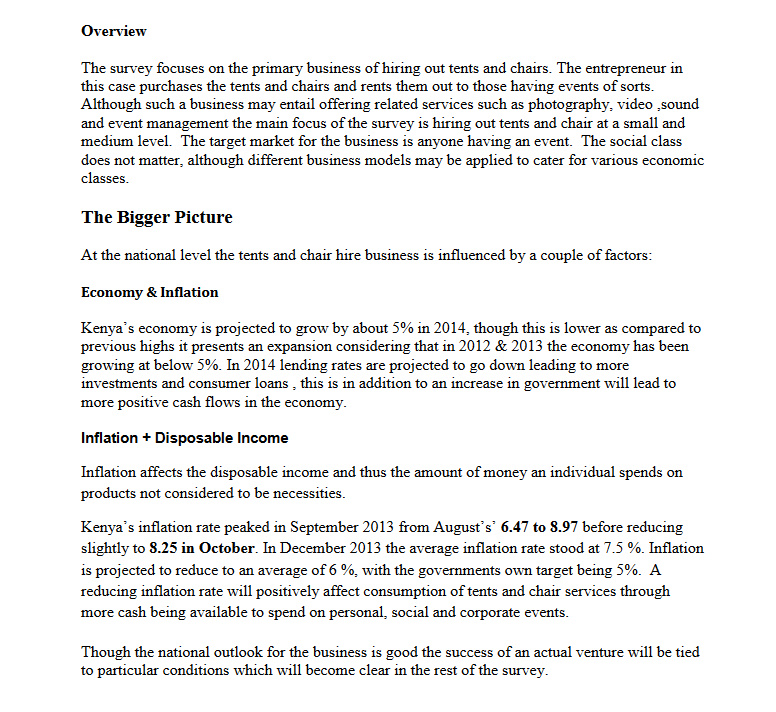Tents & Chair Leasing Business Plan
Tents & Chair Leasing Business Plan

Tents & Chair Leasing Business Plan Overview
The Tents & Chair Leasing Business Plan focuses on the primary business of hiring out tents and chairs. The entrepreneur in this case purchases the tents and chairs and rents them out to those having events of sorts. Although such a business may entail offering related services such as photography, video ,sound and event management the main focus of the survey is hiring out tents and chair at a small and medium level. The target market for the business is anyone having an event. The social class does not matter, although different business models may be applied to cater for various economic classes.
Inflation affects the disposable income and thus the amount of money an individual spends on products not considered to be necessities.
Kenya’s inflation rate peaked in September 2020 from August’s’ 6.47 to 8.97 before reducing slightly to 8.25 in October. In December 2020 the average inflation rate stood at 7.5 %. Inflation is projected to reduce to an average of 6 %, with the governments own target being 5%. A reducing inflation rate will positively affect consumption of tents and chair services through more cash being available to spend on personal, social and corporate events.
Though the national outlook for the business is good the success of an actual venture will be tied to particular conditions which will become clear in the rest of the Tents & Chair Leasing Business Plan.
Generally competition in the tents and chair hiring out business is intense and will continue to increase. For a start the barriers to entry in the business have been gradually reducing for the last 6 years. Equipment prices have gone down as a result of one rivalry among big manufacturers of plastic chairs and tents, two the rise of small independent tent makers and thirdly importers of the same items. The relatively low prices have allowed more entrepreneurs to join the business.
Demand for higher quality events has increased driven by lower equipment prices, a recovering economy and lifestyle exposure through education, shows on television, access to the internet and travel. The surge in demand has attracted and continues to attract more investors to the business.
Capital, as seen above, is not a barrier too; there are entrepreneurs who have started the business with as little as Ksh.20, 000. Again there are no special skills or licenses required to run the business. Any one with basic marketing knowledge and an investing spirit can run with some level of success this kind of business.
Nevertheless competition is not evenly distributed with some urban centers under served, almost saturated or headed towards maturity. Maturity in this case means that the market is big enough to sustain the existing players profitably, while saturation means that new entrants take longer to break even and older businesses record lower profits.
In Nairobi all segments of the market, by social class, events or customer (weddings, funerals, corporate, individual etc) are served while geographically not all locations are well served. Although purchase decisions are not tied to location there are advantages in setting up in less competitive areas.
The market is segmented such that there are no players fully dominating. This implies that a new entrant with the right mix of factors (as will be seen below) has more than fair chances of succeeding. Of course there are a few big players ( like Wonderjoy & Chairmania) ,by scale, that have made considerable progress in branding as one stop event companies yet their share of the market is not big enough to discourage the entry of new players or lead to obvious low returns for the existing providers.
Download Tents & Chair Leasing Business Plan / guide here